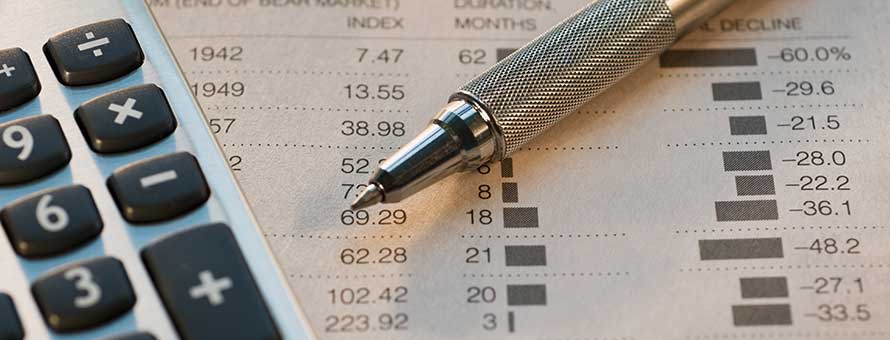How to Become a Forensic Accountant

Understanding the numbers
When reviewing job growth and salary information, it’s important to remember that actual numbers can vary due to many different factors—like years of experience in the role, industry of employment, geographic location, worker skill and economic conditions. Cited projections are based on Bureau of Labor Statistics data, not on SNHU graduate outcomes, and do not guarantee actual salary or job growth.

The primary focus of forensic accounting is collecting and leveraging data for litigation: "forensic" literally means "suitable for use in a court of law." Thus, accountants in this field are often tasked with investigating fraud in complicated financial transactions, such as mergers and acquisitions, bankruptcies and contract disputes.
"Forensic accounting is an exciting and specialized area of accounting that combines financial expertise with investigative work," said Mona Stephens, CPA, MSA, MS.DAN, an associate dean of business analytics and undergraduate accounting programs at Southern New Hampshire University (SNHU) with over two decades of experience in higher education and 25 years of accounting experience. "If you're interested in solving problems and digging into details, this could be a great fit."
What Does It Take to Be an Accountant?
To become an accountant, you will likely need a bachelor's degree in accounting or a similar field, and some companies prefer candidates with a master's degree.
And if your role entails filing reports with the Securities and Exchange Commission (SEC), you'll need to be a Certified Public Accountant (CPA). CPAs are licensed by your state accounting board.
No matter where you get your license, the CPA licensure requires you to have at least 150 credit hours of education, according to Stephens.
A bachelor's degree is 120 credit hours, which means you will need another 30 credit hours of education. A master's degree or certificate could be a way to earn those remaining credit hours, Stephens said.

Accounting is a career that offers both stability and growth. According to BLS, accountants and auditors earned a median salary of $81,680 in 2024, and jobs in this field are projected to grow by 6% percent through 2033.*
How Do You Become a Certified Forensic Accountant?
If you love data and find complex challenges appealing, this might just be the right field for you. Here’s how to become a forensic accountant:
 Explore Your Options
Explore Your Options
Every degree program is slightly different, so it's important to research different institutions and find the one that best meets your needs. For many busy professionals, an online degree provides the flexibility required to take the next step toward becoming a forensic accountant.
If this applies to you, consider an accounting bachelor's degree and find a program where you can specialize.
 Undergraduate Education
Undergraduate Education
During an undergraduate degree program, you'll be taught the basic tenets of how to become a forensic accountant. Keep in mind, however, that state requirements may vary on what it takes to become an accountant, and you should always check within your own state to ensure you are on track with requirements specific to your own location.
An undergraduate program involves learning the concepts and practices used in the recording, classification and reporting of cost data, along with issues particular to this discipline. You'll then go through financial accounting practices and gain a deeper understanding of the standards that are used to evaluate them.
"Take coursework in forensic accounting and fraud examination to gain specialized knowledge in fraud detection, investigative methods and legal procedures," Stephens said.
Once that groundwork has been laid, you're able to begin the conversation regarding liabilities, including recording and disclosure requirements. As part of this endeavor, you'll also gain insight into CPA simulation questions and the usage of the Fatality Analysis Reporting System (FARS) database.

Corey Marrone Brizak ’19 had been working in the accounting field for some time and said she knew if she wanted to advance to the next step in her career, an accounting degree was her next move.
Having earned a bachelor’s degree in accounting with a concentration in forensic accounting and fraud examination, she said that her courses prepared her well for her accounting career.
“I greatly enjoyed all the classes from my forensic concentration,” said Marrone Brizak. “They were full of scenarios that could be part of everyday life in the field.”
After completing her degree, she was able to apply the newly learned skills in her new role using her forensic education to ensure company compliance, she said.
"I feel that I was well prepared to join my work team and fall right into place," Marrone Brizak said.
What You'll Learn
A large part of the forensic accountant's job is being able to identify fraud accurately. An online program should teach you how to spot its symptoms, including accounting fraud, stock fraud, employee theft and embezzlement.
A degree in forensic accounting can also prepare you for other roles in the field, including:
- Financial Examiner
- Internal Auditor
- Management Accountant
- Public Accountant
The skills needed for these roles are developed through specialized coursework following accounting rules and regulations.
Coursework also includes a deeper look into the ways fraud impacts the presentation of financial information and how to review and analyze financial statements for evidence of wrongdoing. You will be given the tools necessary to judge the financial health of a company and determine whether it is right for a merger or acquisition.
Fraud changes as fast as technology does, so any thorough education in forensic accounting must cover computer crimes. Course material includes tech skills for accountants, such as the discovery of digital evidence, the fundamentals of working with data and how to present your findings. You'll learn about identity theft and other cybercrimes and how to follow best practices in a fast-changing digital landscape.
You'll also learn what happens after fraud has been potentially uncovered, such as what the relevant legislation to the situation is, how to interview the people involved and what legal proceedings may arise when fraud is suspected.
Forensic accounting can be a challenging but critical and rewarding area of accounting. A bachelor's degree in forensic accounting provides you with the strong foundational knowledge to prepare you for this field.
Find Your Program
 Beyond the Bachelor's
Beyond the Bachelor's
Beyond the courses offered in an undergraduate program, you could consider an advanced degree, a certificate — or both.
"Employers may prefer or even require a master’s degree in forensic accounting, business administration or a similar discipline," Stephens said.
If you're interested in a master's, think about whether a Master of Science (MS) in Accounting or a Master of Business Administration (MBA) in Accounting could help you reach your goals.
A certificate can help you further specialize in the field of forensic accounting. You can pair a forensic accounting certificate with your master's in accounting or earn a certificate individually. If you decide to earn a certificate individually, you could potentially reduce the amount of time and money required for your MS in Accounting through any shared courses.
![]() While the certificate offers a strong accounting foundation with a specialized focus in forensic accounting, the MBA provides a graduate business degree that positions candidates across broad industries in many roles yet has an extra emphasis on accounting as well.
While the certificate offers a strong accounting foundation with a specialized focus in forensic accounting, the MBA provides a graduate business degree that positions candidates across broad industries in many roles yet has an extra emphasis on accounting as well.
There are potential advantages: BLS reports that the 2024 median weekly earnings with a master’s degree were 19% higher than those with a bachelor’s degree.* On average, those with a master's degree had median weekly earnings of $1,840, BLS said, compared to a median of $1,543 for those with only a bachelor's degree.*
The potential to earn more is not the only reason a master's degree in accounting is worth it, you can obtain a more in-depth understanding of the principles of forensic accounting while earning your master's degree, but you'll also gain professional business training and the tools required to improve job prospects and earning potential.
Is a master's degree in accounting worth it? Read more.
 Prepare for the Workforce
Prepare for the Workforce
In addition to your accounting education, you may wish to enhance your employability through networking, participating in experiential learning opportunities and earning certifications.
"Gaining experience through internships or entry-level roles in fraud prevention, compliance or auditing can help you apply what you’ve learned in real-world settings," Stephens said. "Earning certifications like the CPA or CFE (Certified Fraud Examiner) early in your career can also give you a competitive edge."
A major benefit of attending college is that you’ll have access to a full range of critical career services available to you as a student and post-graduation, as well. You’ll have someone on your side, supporting your success every step of the way.
Some advantages of career services are:
- Mock interviews
- Networking advice and opportunities
- Resume and cover letter review and assistance

- Salary negotiation advice and so much more
Along with career services, you'll have a chance to grow your professional network simply by being taught by long-time professionals in the field. You’ll be encouraged to attend networking events and connect with others in the field. Searching a list of accounting associations, and joining those most relevant to your goals, is a strong first step to creating lasting industry connections that lead to career opportunities.
Upon completion of your degree, you can also join an alumni association at your university. Being an active part of an alumni association is a proactive way to network with other alumni. Your alumni network offers you an opportunity to meet, and engage with, professionals in your desired field of work.
What is It Like to Be a Forensic Accountant?
Forensic accounting is a unique field that can be both exciting and challenging, according to Stephens.
"You’ll spend a lot of time digging into financial records to uncover inconsistencies or signs of fraud, which can feel a bit like solving a puzzle," she said. "The job often includes analyzing data, interviewing people, writing detailed reports and sometimes even testifying in court."
If you can picture yourself as both an investigator and a financial pro, this role might be for you. Although the job isn't simple, it can be fascinating and hugely impactful.
"It can be fast-paced, especially when you're working on tight deadlines for legal cases, but it’s also very rewarding," said Stephens. "You get to make a real difference by helping uncover the truth and supporting the justice system."
Discover more about SNHU's bachelor's in accounting with a concentration in forensic accounting and fraud examination: Find out what courses you'll take, skills you'll learn and how to request information about the program.
*Cited job growth projections may not reflect local and/or short-term economic or job conditions and do not guarantee actual job growth. Actual salaries and/or earning potential may be the result of a combination of factors including, but not limited to: years of experience, industry of employment, geographic location, and worker skill.
Alexa Gustavsen ’21 is a content marketing specialist and writer at Southern New Hampshire University. Based in New Hampshire, she completed her bachelor's in creative writing and English on campus at SNHU. Currently, she is pursuing her master's in marketing online at the university. Connect with her on LinkedIn.
Explore more content like this article

For Jazzmen Shipp, Earning a Degree Changed Everything

How Kellsie Goodhart-Jones Earned an MBA While Working for the US Air Force

What Jobs Can You Get with a Business Degree?
About Southern New Hampshire University

SNHU is a nonprofit, accredited university with a mission to make high-quality education more accessible and affordable for everyone.
Founded in 1932, and online since 1995, we’ve helped countless students reach their goals with flexible, career-focused programs. Our 300-acre campus in Manchester, NH is home to over 3,000 students, and we serve over 135,000 students online. Visit our about SNHU page to learn more about our mission, accreditations, leadership team, national recognitions and awards.


